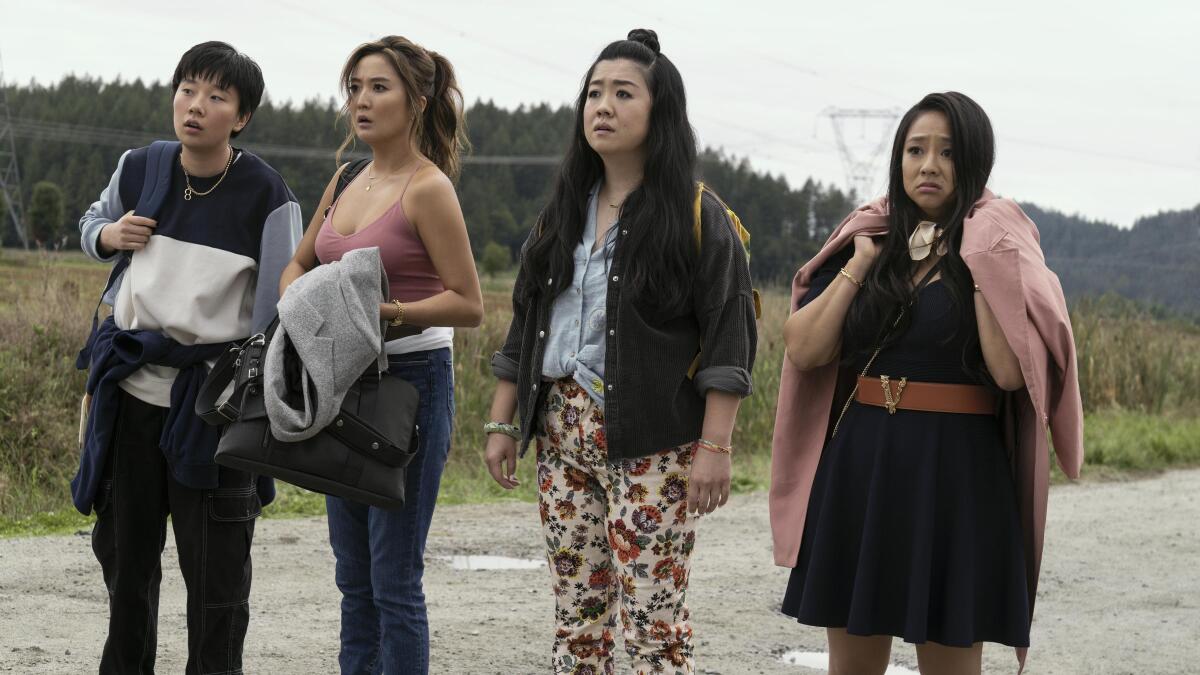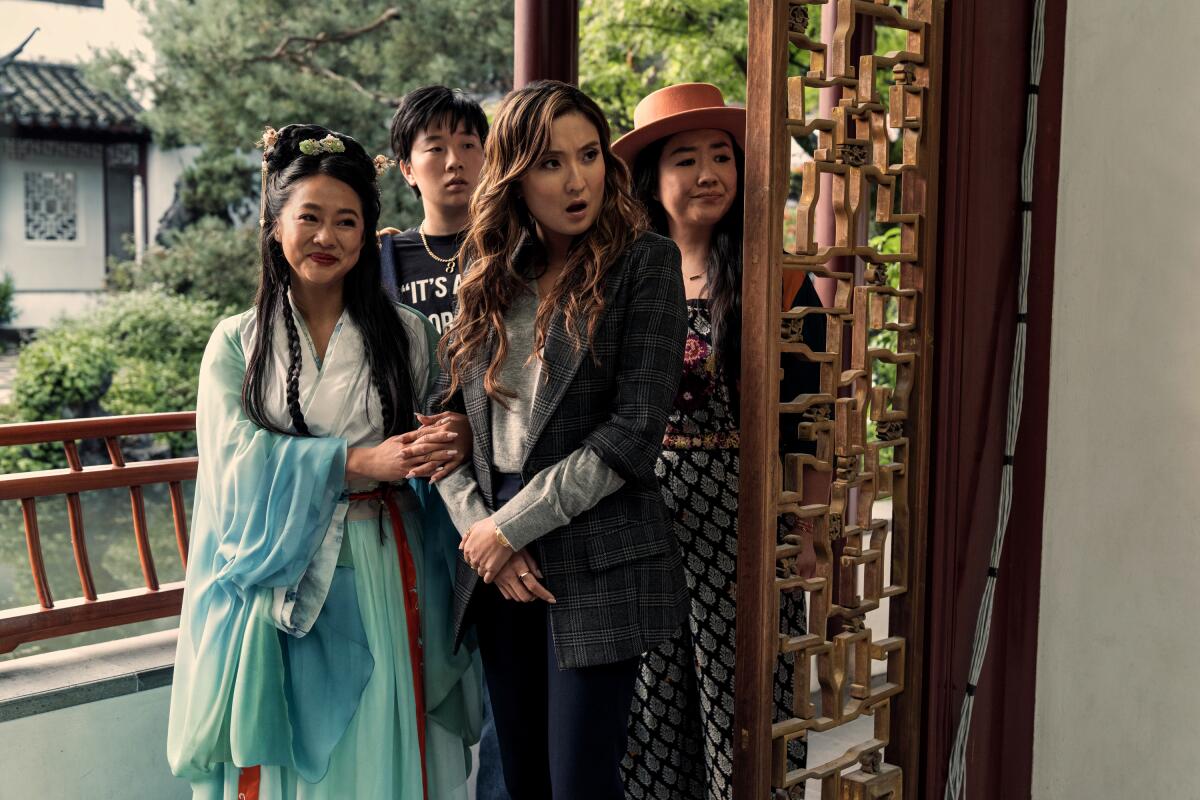The exuberantly rude ‘Joy Ride’ gives its stars the raunch-pad they deserve

- Share via
A good gross-out gag is hardly a novelty in mainstream comedies, but there’s one in “Joy Ride” that made my stomach almost — almost — flip in solidarity. It happens in a Beijing nightclub where Audrey (Ashley Park), an American lawyer wooing a potential client (Ronny Chieng), is invited, or rather pressured, to enjoy a well-known local delicacy with a slurpable twist. “Are thousand-year-old-egg cocktails really a thing?” I wondered in ignorance and horror, thinking of all the dark, gelatinous egg chunks I’d left in my own congee bowls as a kid, despite my parents’ insistence that I should eat them and like them. Would a shot of liquor have made them more palatable? I don’t know; I’ll never know. But in that moment, Audrey’s revulsion, to say nothing of her bad-Asian guilt, were very much my own.
You might guess some of what happens next. Audrey projectile-vomits all over the client-to-be, enduring the kind of squirmy ritual humiliation that awaits many an insecure, tightly wound comedy protagonist. But “Joy Ride,” an amusingly rude and high-spirited romp from the debuting director Adele Lim (a co-writer on “Crazy Rich Asians”), has a way of turning predictable story beats into spiky, revealing cultural distinctions.
You’ve seen a lot of strait-laced overachievers learn to lighten up and cut loose on-screen. You’ve seen fewer like Audrey, who was adopted in China and raised in America by white parents, and who’s now visiting her birth country for the first time with friends who are more laid-back, in part, because they’re better versed in the culture and language than she is. (“I’m just a garbage American who only speaks English,” Audrey admits in a moment of drunken confession.) And so the group dynamics are rooted in the usual differences of temperament and personality, yes, but also in nuances of personal upbringing and diasporic experience. This journey really does take Audrey on a journey.
The closest of her traveling companions is Lolo (Sherry Cola), her best pal since they first met as kids in a predominantly white Washington state suburb. A disarmingly funny childhood prologue — there’s a racist slur, a choice expletive and some swift, brutal playground fisticuffs — establishes the characters and their inseparably complementary dynamic. Lolo is the brassy, foul-mouthed, uninhibited one; she grows up to be an artist specializing in sexually explicit sculptures, many of which riff cleverly on the Chinese culture she knows intimately well. The more responsible Audrey, always eager to please and to prove herself, is an attorney in the fast lane, a lone Asian American female powerhouse surrounded by white men in suits (including Timothy Simons as her boss, serving up a sly caricature of performative allyship).
Lolo strengthens Audrey’s pluck and confidence; Audrey gives Lolo encouragement and a roof over her head. And so it’s unsurprising, if ill-advised, when Audrey brings Lolo along as her personal translator on a high-stakes overseas business trip. It’s also the kind of easy-to-swallow, conveniently friendship-testing contrivance that abounds in Cherry Chevapravatdumrong and Teresa Hsiao’s script, including Audrey’s decision to spend her high-stakes overseas business trip searching for her long-lost birth mother. Tagging along for the ride is Lolo’s non-binary cousin (Sabrina Wu), a K-pop obsessive who’s nicknamed Deadeye for their combination of affectless stares and goofy grins. And then there’s Audrey’s old college pal Kat (Stephanie Hsu), an actor with a popular Chinese soap-opera gig and a super-Christian fiancé (Desmond Chiam) from whom she’s trying to hide her long list of past sexual partners.

Hsu received an Oscar nomination earlier this year for her melancholy supporting turn in “Everything Everywhere All at Once,” a role that only moderately prepares you for her welcome display of randy comic gusto and killer timing here. She and Cola supply much of the story’s comic energy early on, some of it predicated on Kat and Lolo’s mutual loathing and some of it on their raging libidos. The raucousness proves infectious as Audrey, Lolo, Kat and Deadeye embark on a wild trek through the Chinese countryside, becoming reluctant mules for a drug dealer (Meredith Hagner) one minute, and hooking up with some hunky professional athletes the next.
Along the way, Audrey’s most shortsighted assumptions — the way she shies away from the locals she can’t understand and gravitates toward the white English speakers she occasionally encounters — are productively and amusingly upended. Lim and her writers have a knack for casual subversion, whether they’re flooding the screen with ripped Asian male torsos or staging a bubble-gum-hued K-pop-style Cardi B cover. Or, in a moment that will cause heads in every theater to nod in unison, suggesting that few people are more racist, in the end, than Asians are toward other Asians.
Beneath all the sexual-scatological shenanigans, the cocaine enemas and the cunnilingual injuries, there’s a familiar, even dutiful representational strategy at play. If comedies like “Bridesmaids” and “Girls Trip” were lauded, justly if somewhat reductively, for suggesting that women (white and Black, respectively) could be as funny and hard-R raunchy as their slovenly white-male counterparts in, say, “The Hangover” movies, “Joy Ride” means to accomplish something similarly liberating for Asian American female and gender-nonconforming characters everywhere. It also means to tear away the stereotypical veil of docility and propriety in which such characters have too often been presented, to the extent that they’ve been presented at all.
None of which, however well-intended, makes the movie a success by default. To love rude, regressive humor is to know there’s a danger in reducing it to a crude competitive sport or, worse, a declaration of intent. But while “Joy Ride” has its borderline-mechanical moments — a vigorous sex-a-thon montage is both amusing and overly calculated — it moves too swiftly and good-humoredly, for the most part, to fall into this trap for long. It also has actors who, even when cleaving to their characters’ broadest outlines or going for obvious, outlandish laughs, simply possess too much warmth and emotional vibrancy to ever seem one-note.
The joy of “Joy Ride” is certainly there in the sexual repartee, the caustic insults and the foul-mouthed zingers, all of which Lim paces with nary-a-wasted-moment velocity. But it’s also there in the warmly inviting smile that steals across Cola’s face as her Lolo talks about sex as a universal ideal, a source of affirmation rather than shame. Or the way Wu’s face lights up when Deadeye talks about why they like K-pop so much, since it’s the rare thing that actually likes them back. Park, in some ways, gives the trickiest performance as Audrey, the straight woman here in every sense: She has to singlehandedly carry “Joy Ride” through its inevitable, conventional tonal shift from sassy to sentimental, from fallout to reconciliation. She’s egg-ceptional.
'Joy Ride'
Rating: R, for strong and crude sexual content, language throughout, drug content and brief graphic nudity
Running time: 1 hour, 32 minutes
Playing: Starts July 7 in general release
More to Read
Only good movies
Get the Indie Focus newsletter, Mark Olsen's weekly guide to the world of cinema.
You may occasionally receive promotional content from the Los Angeles Times.










